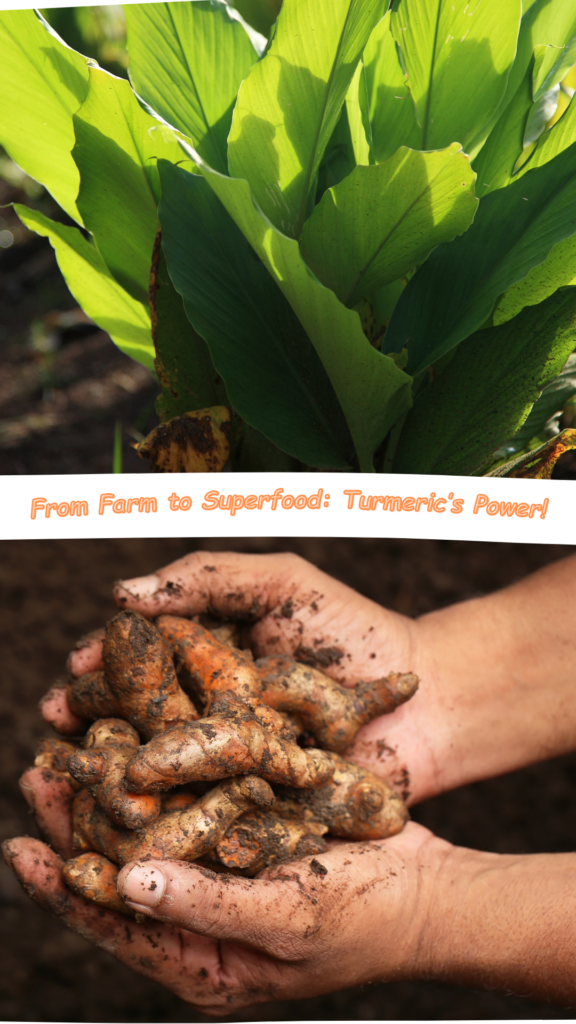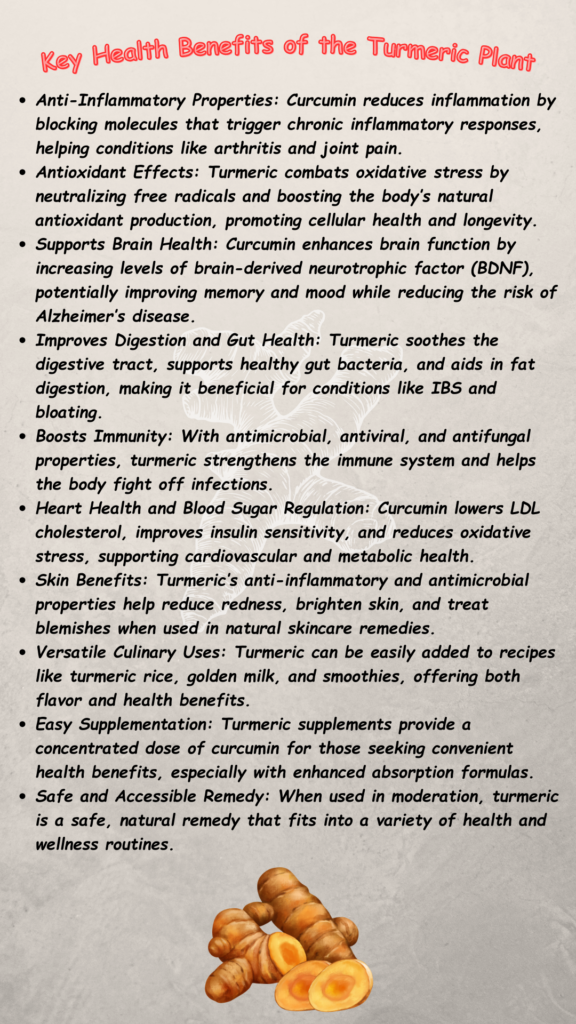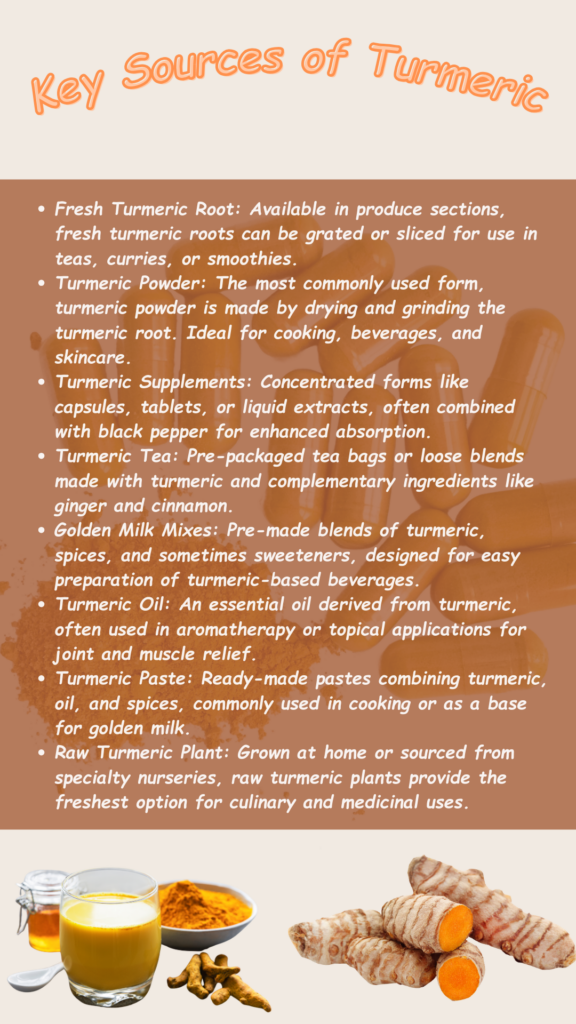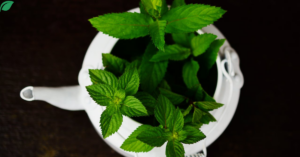Disclaimer: Educational Purposes Only – The information in this article is for educational purposes only and has not been evaluated by the Food and Drug Administration (FDA). It is not intended to diagnose, treat, cure, or prevent any medical condition. Natural remedies can affect individuals differently, and what works for one person may not work for another. Some herbs or natural substances may cause allergic reactions or interact with medications. Always consult a qualified healthcare professional before starting any new health regimen, especially if you are pregnant, nursing, taking medications, or have a pre-existing health condition. Perform a patch test for topical remedies and introduce herbal treatments gradually to monitor for any adverse effects.
This blog contains affiliate links. I may earn a small commission at no extra cost to you if you make a purchase through these links. Thank you for being so supportive!

Turmeric Plant: Nature’s Golden Remedy for Better Health
The turmeric plant is revered for its vibrant hue and extraordinary health benefits. From traditional Ayurvedic medicine to modern wellness trends, this golden spice has proven a powerful natural remedy.
Whether you’re seeking relief from inflammation, support for digestion, or a boost to your immune system, the turmeric plant offers a wealth of healing potential. But how can you maximize its benefits while avoiding common pitfalls?
In this article, you will learn:
- The top scientifically-backed health benefits of the turmeric plant.
- Practical ways to incorporate turmeric into your daily routine.
- Myths and facts about using turmeric as a natural health remedy.
Get ready to unlock the full potential of the turmeric plant and its amazing benefits!
What is the Turmeric Plant?
The turmeric plant (Curcuma longa) is a perennial herbaceous plant native to South Asia, particularly India, where it has been cultivated for thousands of years. It belongs to the ginger family (Zingiberaceae) and thrives in warm, humid climates with plenty of rainfall. Known for its vibrant yellow-orange root, the turmeric plant is a cornerstone of traditional medicine and culinary practices around the globe.
The plant’s most celebrated component is curcumin, the bioactive compound responsible for its powerful health benefits. Curcumin is a potent anti-inflammatory and antioxidant, making it a critical ingredient in both ancient remedies and modern supplements. Historically, turmeric has been used to treat various ailments, from skin disorders to digestive issues, and today, it is a leading natural health remedy worldwide.
The turmeric plant has played a vital role in holistic healing and has gained global recognition as a superfood. Its increasing popularity in the wellness industry highlights its versatility, as it can be consumed fresh, dried, or as an extract.
Next, we’ll explore the top health benefits that make the turmeric plant a true natural remedy.
Top Health Benefits of the Turmeric Plant
The turmeric plant offers numerous scientifically-backed benefits, making it a staple in natural health remedies. Below, we’ll expand on its top health benefits and how they work.
- Anti-Inflammatory Properties
Chronic inflammation is a root cause of many health problems, including arthritis, heart disease, and autoimmune disorders. Turmeric curcumin is a powerful natural anti-inflammatory agent that inhibits molecules like NF-kB that trigger inflammation.
Studies have shown that curcumin is as effective as some over-the-counter anti-inflammatory drugs but without the side effects. Incorporating turmeric into one’s diet or using curcumin supplements may help reduce joint pain and swelling for people with osteoarthritis or rheumatoid arthritis.
- Powerful Antioxidant Effects
Oxidative stress occurs when the body’s free radicals and antioxidants are imbalanced, leading to cellular damage and aging. Curcumin is a potent antioxidant that scavenges harmful free radicals and boosts the body’s production of its own antioxidant enzymes.
This dual action makes turmeric especially valuable for protecting cells and reducing the risk of chronic diseases like cancer, cardiovascular disease, and neurodegenerative disorders. Its antioxidant properties also contribute to healthy skin and anti-aging benefits.
- Brain Health and Cognitive Support
The turmeric plant’s benefits extend to the brain, thanks to curcumin’s ability to cross the blood-brain barrier. Once in the brain, curcumin increases brain-derived neurotrophic factor (BDNF) levels, a protein that supports the growth and survival of neurons. Low BDNF levels are linked to neurodegenerative diseases like Alzheimer’s and mental health issues like depression.
In clinical studies, curcumin has been shown to improve memory and mood, making it a promising natural supplement for cognitive health. Regular consumption of turmeric may also help slow down the progression of neurodegenerative diseases.
- Enhanced Digestion and Gut Health
For centuries, the turmeric plant has been used to treat digestive issues. Its anti-inflammatory properties soothe the digestive tract, while its antimicrobial effects help combat harmful bacteria that can disrupt gut health.
Curcumin also stimulates the production of bile, which aids in fat digestion. Because of the bile stimulation, curcumin makes turmeric particularly helpful for conditions like indigestion, irritable bowel syndrome (IBS), and bloating. Studies suggest that curcumin can reduce symptoms in people with inflammatory bowel disease (IBD) when combined with conventional treatments.
- Immune System Boost
The turmeric plant plays a vital role in supporting the immune system. Curcumin’s antimicrobial, antiviral, and antifungal properties help protect the body from infections. Additionally, curcumin modulates the immune response, making it more effective in targeting pathogens without causing excessive inflammation.
In a world where boosting immunity is a priority, adding turmeric to your diet through teas, golden milk, or supplements can be a simple way to support your body’s defenses, particularly during flu seasons or times of high stress.
- Blood Sugar and Heart Health Management
Curcumin is known to help regulate blood sugar levels and improve insulin sensitivity, making it a valuable tool for people with diabetes or at risk of developing it. Curcumin also protects the blood vessels and heart by reducing oxidative stress and inflammation.
It can lower LDL cholesterol (the “bad” cholesterol) and triglycerides while improving HDL cholesterol (the “good” cholesterol). These effects, combined with its ability to reduce blood pressure, make turmeric a heart-healthy choice for long-term wellness.
The turmeric plant’s benefits are vast, making it an invaluable addition to a natural health routine. The next section will discuss practical ways to incorporate turmeric into your daily life for maximum impact.
How to Incorporate the Turmeric Plant into Your Daily Life
Adding the turmeric plant to your daily routine is easier than you think. With its versatility, you can enjoy turmeric in various forms, from cooking to supplements and even skincare. Below are some practical ways to incorporate turmeric into your life for maximum health benefits.
Culinary Uses
Turmeric has been a staple in cooking for centuries, particularly in Indian and Southeast Asian cuisines. Its earthy, slightly bitter flavor and vibrant yellow color make it a favorite in many dishes. Here are some creative ways to add turmeric to your meals:
- Golden Milk: A warm, soothing drink made with turmeric, milk (or plant-based alternatives), and a pinch of black pepper to enhance curcumin absorption. This beverage is ideal for relaxation and immune support, especially during colder months.
- Turmeric Rice: Turmeric rice is a fragrant and colorful dish that pairs well with curries or grilled vegetables. For a flavorful twist, simply add a teaspoon of turmeric powder, a bay leaf, and a touch of cumin to your rice while it cooks.
- Lentil Soup (Dal): A hearty and nutritious option, turmeric adds depth and richness to this classic dish. Combine lentils, garlic, ginger, and turmeric with your choice of vegetables for a comforting meal.
- Roasted Vegetables: Before roasting cauliflower, carrots, or sweet potatoes, sprinkle turmeric along with salt, pepper, and olive oil for a healthy and vibrant side dish.
- Smoothies: Blend a teaspoon of turmeric powder with fruits like mango or pineapple, a splash of coconut milk, and a dash of honey for a tropical, health-boosting smoothie.
- Turmeric in Baking: Add turmeric to muffins, bread, or pancake recipes to infuse a subtle flavor and golden hue while reaping its health benefits.
When it comes to cooking with turmeric, the possibilities are endless. Its versatility makes it a perfect addition to various recipes, from traditional dishes to modern health-focused creations.
Turmeric Supplements
Supplements, which come in capsules, powders, or liquid extracts, are convenient for those who may not enjoy the taste of turmeric or want a more concentrated dose.
- To improve absorption, look for curcumin supplements with added piperine (from black pepper).
- Follow the recommended dosage on the product label or consult a healthcare professional for guidance.
Turmeric Teas and Beverages
Turmeric tea, often paired with ginger and lemon, is a refreshing and healthful way to enjoy the benefits of the turmeric plant. Pre-made turmeric tea bags are widely available, or you can make your own by steeping fresh or powdered turmeric in hot water.
Skincare Applications
Turmeric’s anti-inflammatory and antimicrobial properties make it a favorite ingredient in natural skincare remedies.
- Face Masks: Mix turmeric powder with yogurt and honey for a nourishing mask that reduces redness and brightens skin.
- Spot Treatments: Apply a paste with turmeric and water to blemishes or dark spots.
Turmeric for Pets
Even your pets can benefit from turmeric! Many pet owners add a small amount of turmeric powder to their pets’ meals to support joint health and reduce inflammation. Be sure to consult a veterinarian for the correct dosage.
Precautions for Use
While turmeric is generally safe for most people, there are a few things to keep in mind:
- Avoid excessive doses: Large amounts may cause gastrointestinal discomfort or interact with medications like blood thinners.
- Enhance absorption: Combine turmeric with black pepper or healthy fats (like coconut oil or olive oil) to improve curcumin absorption.
- Consult your doctor: Before using turmeric, seek professional advice if you’re pregnant, nursing, or managing a chronic condition.
Incorporating the turmeric plant into your routine doesn’t have to be complicated. Whether you enjoy it in your meals, as a supplement, or in your self-care routine, turmeric offers countless opportunities to enhance your health naturally.
Myths and Misconceptions About the Turmeric Plant
Despite the growing popularity of the turmeric plant as a natural health remedy, some several myths and misconceptions can lead to confusion or misuse. Let’s separate fact from fiction to ensure you get the most out of this golden spice.
Turmeric Is a Cure-All
One of the most common misconceptions is that turmeric can cure all ailments. While turmeric, particularly curcumin, has many health benefits, it is not a magic bullet. It works best as part of a balanced diet and healthy lifestyle. Turmeric may complement other treatments for serious medical conditions but should not replace professional medical care.
More Is Always Better
Some people believe that taking high doses of turmeric or curcumin will lead to faster or more effective results. In reality, consuming excessive amounts can cause side effects, including stomach upset, nausea, or dizziness. Moderation is key, and you should always follow recommended dosages.
Turmeric Absorbs Easily on Its Own
Curcumin, the active compound in turmeric, has low bioavailability, meaning that the body does not easily absorb it. Much of the curcumin consumed may be excreted without assistance before the body can use it. Combining turmeric with black pepper (containing piperine) or healthy fats significantly enhances absorption and maximizes its benefits.
Cooking Destroys Turmeric’s Health Benefits
Another misconception is that cooking with turmeric reduces its potency. While extreme heat can degrade some nutrients, most of turmeric’s benefits remain intact during normal cooking. Adding turmeric to your dishes is a practical and effective way to enjoy its health properties.
Turmeric Works Instantly
Some people expect immediate results after incorporating turmeric into their routine. However, turmeric’s benefits often accumulate over time with consistent use. For example, its anti-inflammatory effects may take weeks to become noticeable, especially for chronic conditions like arthritis.
Turmeric Has No Side Effects
Although turmeric is generally safe for most people, it can have side effects when consumed in large quantities or by those with specific medical conditions. For instance, turmeric may thin the blood, so individuals taking blood-thinning medications or preparing for surgery should use it cautiously. It may also interact with medications for diabetes or acid reflux.
Turmeric and Curcumin Are the Same
While curcumin is the most studied compound in turmeric, it is only one of many active components in the turmeric plant. Whole turmeric may offer additional benefits beyond curcumin due to its other bioactive compounds. Using turmeric in its natural form, such as fresh roots or powder, can provide a more holistic range of benefits.
Understanding these myths and misconceptions helps you make informed decisions about using the turmeric plant for your health. By focusing on accurate information and proper usage, you can harness the full potential of this golden remedy.
Next, we’ll summarize the key takeaways from this guide and suggest your next steps to explore turmeric further.
Turmeric Plant: Your Gateway to Natural Health
The turmeric plant is a remarkable gift from nature. It offers a wide range of health benefits rooted in centuries of traditional use and backed by modern science. Its anti-inflammatory and antioxidant properties, as well as its ability to support brain health, digestion, and immunity, make it a powerful addition to any natural health routine.
Key takeaways from this article:
- The turmeric plant’s active compound, curcumin, is a potent anti-inflammatory and antioxidant.
- Turmeric can be easily incorporated into your daily life through cooking, supplements, and skincare.
- To maximize its benefits safely, myths about turmeric, such as its status as a cure-all or the need for excessive consumption, should be debunked.
As you begin to explore turmeric’s benefits, consider experimenting with recipes like turmeric rice or golden milk or consulting a healthcare provider about supplements tailored to your needs. For your next step, dive deeper into specific turmeric-based recipes or learn about other natural remedies that complement its effects, such as ginger or ashwagandha.
Unlock the full potential of the turmeric plant and make it a cornerstone of your journey toward a healthier lifestyle.









Pingback: Common Home Remedies: Herbal Solutions You Can Start Using Today - Herbs Products Online